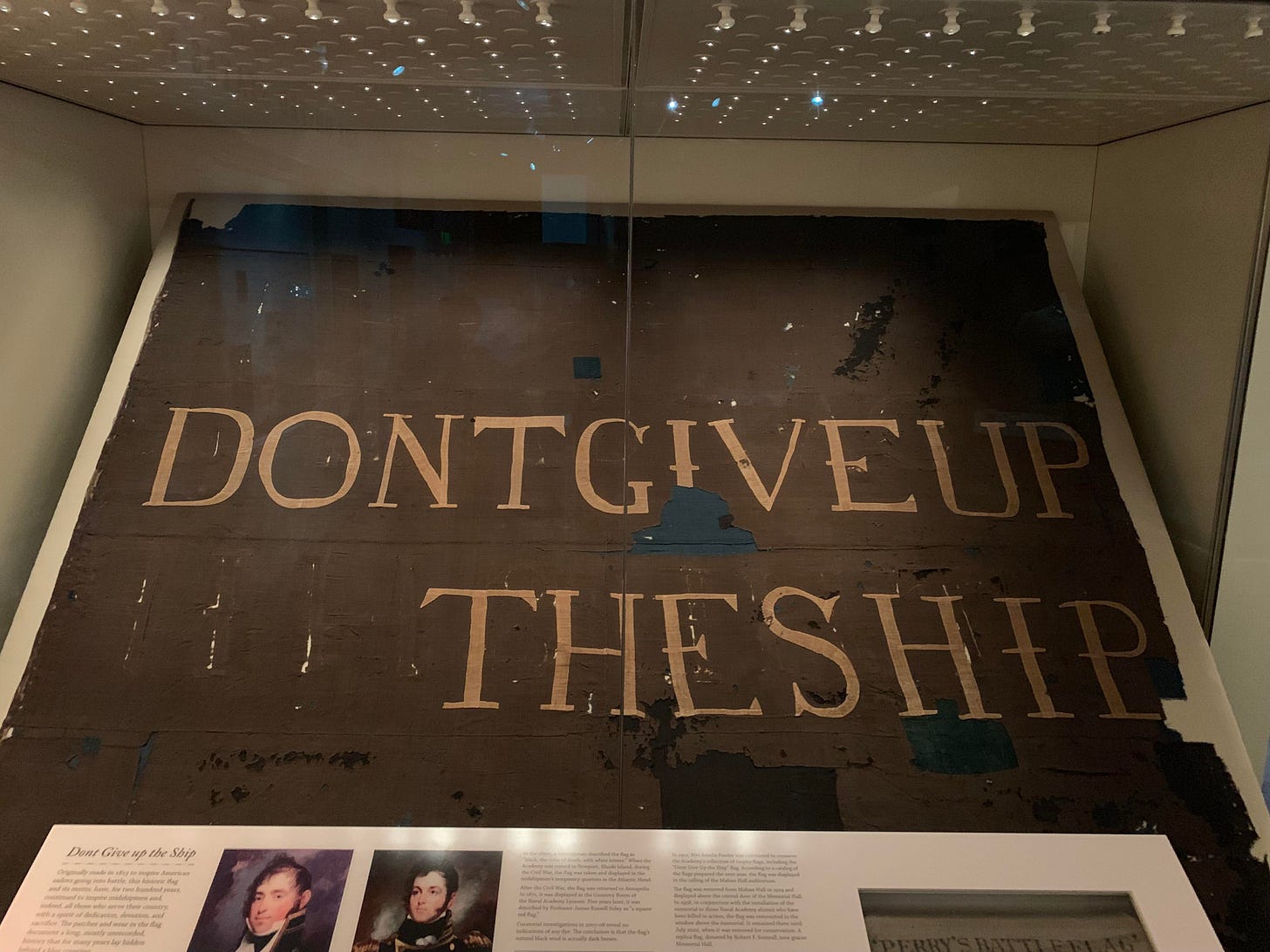Don't Give Up the Ship
In 1813, the British navy imposed a blockade of Boston Harbor. The War of 1812 had been raging for over a year and American forces were eager to break the blockade. James Lawrence, the commander of the Chesapeake, took at a run at the HMS (His Majesty’s Ship) Shannon and engaged her in battle. The Chesapeake took the worst of the fire, and as cannon and grape shot raked the deck, Lawrence was hit. As he lay dying, he gave one last command to his men — “Don’t give up the ship.”
The Chesapeake was captured, but Lawrence’s dying words quick spread. Oliver Hazard Perry (yes that’s his real middle name), heard the story in Erie Pennsylvania as he managed the completion of a new naval squadron on the Great Lakes. He named his flag ship the Lawrence and made a battle flag with his friend’s famous words.
On September 10, 1813, he raised this flag over the Lawrence and sailed onto the lake to challenge the British fleet. The HMS Detroit possessed longer-range guns and inflicted horrific damage to the Lawrence. By the end of the battle, it was mostly disabled, 80% of the crew was wounded or killed, and only one cannon remained in working order.
Perry pulled down his flag, boarded a small boat, and rowed with a handful of crew to the USS Niagara. Perry might have temporarily lost the Lawrence, but he won the battle. Several hours later, the British commander, Robert H. Barclay, surrendered. He had sustained injuries himself, a third of his sailors were wounded or killed, and most of his squadron was adrift.
Perry returned to the Lawrence and forced Barclay to deliver the terms of surrender on the nearly-destroyed ship. Reportedly, he wanted the enemy to see the damage they had caused. As he raised up his tattered battle flag above the battered Lawrence, he dispatched an updated to General William Henry Harrison: "We have met the enemy and they are ours."
I’ve been thinking about this moment a lot lately. What it means to not give up the ship, no matter how many masts are broken, how many holes have been blown in its sides, or how much water is rising in the hull. It’s tempting to discard the thing when it feels broken or hopeless, to give into nihilism or apathy.
Reject that feeling. Hold onto optimism, hold onto corny or cliche. I’m not saying being Pollyanna-ish or ignore the real bad that is happening. But as Anne Applebaum often says, “there is nothing inevitable. What happens tomorrow, depends on what we do today.”
With that in mind, I wanted to share the two things I am watching and what I’m trying to do about it.
There is a lot of bad happening right now. A lot of people unsure about their jobs, a lot of bad science, a lot of corruption, a lot of misinformation. Some of it is just going to happen and it can’t be stopped right now. Other things are going to be awful and messy, but we have the capacity to fix long term. Here I’m thinking about our executive departments, payment systems, what we do to Americans at home. To be clear, I don’t wish suffering on anyone and I know people will hurt in the meantime. But it is easier to fix our messes at home than those that involve other parties.
Then there is damage that is much harder to fix.
International alliances. I know, I know. Voters don’t care about foreign policy and alliances are not particularly sexy. But American success was built on good relationships with our neighbors, and our alliances around the globe. Everything about our economy and security depends on these alliances. For example, did you know that most cars pass back and forth over the Canadian border up to 8 times before complete? Sometimes several times per day? Because we have trusted trade arrangements, it makes more sense for a car to go back and forth to different factories to take advantage of that company’s expertise and labor abilities than for us to build all the factories ourselves. This relationship builds a better product at a cheaper cost, and Americans are still employed rather than the entire operation sent overseas.
Similarly, our national security depends on an intelligence sharing apparatus around the world. We need the intelligence that we receive from European, Asian, and Middle Eastern partners to keep Americans and our homeland safe. Early reports of terrorist attacks, cyber attacks, and more require this facilitation of information.
If we keep stomping on these relationships, I’m not sure how many times they will forgive us and take us back. Sure, we can remove the tariffs and reestablish mutual trade arrangements. But what we if burn their intelligence sources and get people killed? How many times can we expect them to trust us if we prove fundamentally untrustworthy. After a certain amount of damage, I worry we won’t be able to come back.
Rule of law. No legal system is perfect and American history is a testament to the imperfections and unfairness of our legal system. At best, it is often an honor system that requires most officials to act in good faith. Many provisions, designed to enforce good behavior, like the Hatch Act, have toothless enforcement provisions. Others, like campaign finance laws, are enforced haphazardly.
But the idea of the rule of the law, the concept that laws apply to us and everyone is theoretically accountable, is essential for a republic to survive. A couple of pressure moments in the future to watch. Will administration officials (both those confirmed and otherwise), reject court orders? Presidents are always frustrated with the courts — that is the natural product of a system of checks and balances. But they don’t usually defy the courts. Even when it hurts them politically. Yes, Andrew Jackson gave the middle finger to the chief justice, but our legal system has evolved just a bit since then.
The other potential pressure point centers around Congress’s potential abdication of its power of the purse. Under the “take care” clause in Article II, the president is responsible for spending the money Congress apportions for various legislation, departments, etc. Delaying or refusing to spend the money is known as impoundment. In 1975, the Supreme Court limited the president’s impoundment power in Train v. City of New York. While the Court was deciding the case, Congress passed the Impoundment Control Act to limit President Nixon’s ability to withhold funds.
The current administration is arguing that they have the right to impound funds and spend them as they see fit. Historically, Congress has been hostile to these efforts, regardless of the party in charge of the presidency or the legislature. If Congress accepts President Trump’s seizure of the purse, Congress functionally no longer exists under the Constitution.
Here is what I am doing:
stay informed, but not doomscrolling. Pick a couple of sources and read/listen to them regularly. Make sure they are smart and diligent sources, and not prone to hysteria.
Talk to people in your life about what you are seeing. You don’t have to scold or lecture, just talk. Lots of people aren’t paying attention, but studies tell us people are more likely to trust information from those close to them already.
Make calls. Call your representatives and senators. They do respond to their constituents, but if they don’t hear from you, how do they know what you want them to do? Most of their constituents won’t call, so your voice will be heard. A lot of people say, “oh my member is already doing what I want, I don’t need to call them.” But that’s not true! If they are doing the right thing, they need to hear praise. It is really important to encourage them to keep it up. If you need help getting started, 5 calls is a great resource.
Engage actively as a citizen. Citizenship isn’t a category, it is a verb. Volunteer, donate, find ways to engage in your community. For me, this means doubling down on education and outreach. What can I do to reach more people? How can I bridge divides? But may for you, that means something else.
It is impossible for one person to focus on everything. If you consume all of the news, it will overwhelm you. Pick your two or three things. They don’t have to be mine. Make a plan. Who can you call? Who can you talk to in your community? What change can you make through tiny baby steps? If you live in a state with off-cycle elections, are you registered to vote?
Don’t give up the ship.
If you are new to my newsletter, thank you! If you’d like to read more, please consider The Cabinet: George Washington and the Creation of an American Institution and Mourning the Presidents. You can also buy my new book, Making the Presidency: John Adams and the Precedents That Forged the Republic.
Available for purchase on Amazon, Bookshop, or wherever you like to buy books. You can buy signed copies of Making the Presidency at Politics & Prose.
Podcasts/Radio:
Cross-Examining History, February 7, 2025, #80: Lindsay Chervinsky
Listening to America, February 3, 2025: Historical Integrity in a Hyper-Partisan Time
Ben Franklin’s World, January 28, 2025, #403: Lindsay M. Chervinsky, From Crisis to Peace: Re-Evaluating the Presidency of John Adams
Bloomberg Daybreak, January 20, 2025: Special Coverage- Donald Trump’s Inauguration
Big Books & Bold Ideas with Kerri Miller, January 17, 2025: On the brink of the inauguration, historians reflect on America’s trajectory
The Burn Bag Podcast, January 13, 2025: President Jimmy Carter- What was his Foreign Policy Legacy? Featuring Presidential Historian Dr. Lindsay Chervinsky
Press:
“Trump’s revenge tour tactics range from petty to potentially dangerous,” MSNBC, January 27, 2025.
“‘People Will Be Shocked’: Trump Tests the Boundaries of the Presidency,” The New York Times, January 26, 2025.
“Can Trump handle the new Republican factions?” Financial Times, January 22, 2025.
“JBU - Rabbit Hole Edition!” The Bulwark, January 21, 2025.
“A new American era is ushered in by a familiar Trump,” The Straits Times, January 21, 2025.
“The history of inauguration speeches and the role of first ladies at inauguration ceremonies,” CBS News, January 20, 2025.
“The history and tradition of presidents leaving personal notes for their successors,” PBS News Weekend, January 19, 2025.
“Biden’s legacy: Historians weigh in on how the 46th president will be remembered,” ABC News, January 19, 2025.
“What to Expect From Trump’s Inauguration Day,” Katie Couric Media, January 19, 2025.
“No experience? No problem. Trump’s Cabinet raises concerns about government dysfunction.” USA Today, January 16, 2025.
“Most presidential farewells are soon forgotten,” National Journal, January 14, 2025.
Events:
February 19, 2025: Sulgrave Club, Washington, DC (rescheduled)
March 4th, 2025: Oregon Historical Society
March 27, 2025: Vail Symposium
April 2, 2025: Cosmos Club
April 8: Ford Foundation, Grand Rapids, MI
May 22, 2025: Thomas Crane Public Library, Quincy 400!
May 29, 2025: Metropolitan Club




Great job, Lindsay! Keep fighting and I will, too!
I am reminded of what Admiral James Stockdale said:
“You must maintain unwavering faith that you can and will prevail in the end, regardless of the difficulties—and at the same time, have the discipline to confront the most brutal facts of your current reality, whatever they may be.”